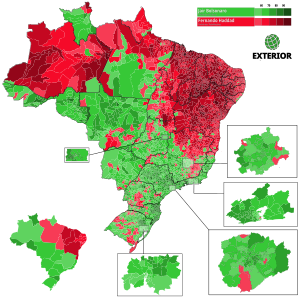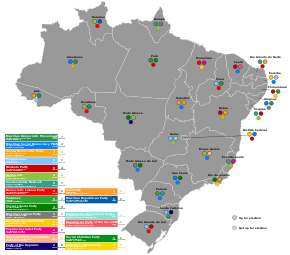
Back الانتخابات العامة البرازيلية 2018 Arabic Eleiciones xenerales de Brasil de 2018 AST Wahlen in Brasilien 2018 German Βραζιλιάνικες γενικές εκλογές 2018 Greek Elecciones generales de Brasil de 2018 Spanish انتخابات سراسری برزیل (۲۰۱۸) Persian Brasilian yleisvaalit 2018 Finnish Élections générales brésiliennes de 2018 French Eleccións xerais do Brasil de 2018 Galician ब्राज़ील आम चुनाव, २०१८ Hindi
|
| ||||||||||||||||||||||||||||||||||||||||||||||||||||||||||||||||||||||||||||||||||||||||||||||||||||||||||||||||||||||||||||||||||||||||||||||||||||||||||||||||||||||||||||||||||||||||||||
Presidential election | ||||||||||||||||||||||||||||||||||||||||||||||||||||||||||||||||||||||||||||||||||||||||||||||||||||||||||||||||||||||||||||||||||||||||||||||||||||||||||||||||||||||||||||||||||||||||||||
| ||||||||||||||||||||||||||||||||||||||||||||||||||||||||||||||||||||||||||||||||||||||||||||||||||||||||||||||||||||||||||||||||||||||||||||||||||||||||||||||||||||||||||||||||||||||||||||
| Opinion polls | ||||||||||||||||||||||||||||||||||||||||||||||||||||||||||||||||||||||||||||||||||||||||||||||||||||||||||||||||||||||||||||||||||||||||||||||||||||||||||||||||||||||||||||||||||||||||||||
| Turnout | 79.67% (first round) 78.70% (second round)[1] | |||||||||||||||||||||||||||||||||||||||||||||||||||||||||||||||||||||||||||||||||||||||||||||||||||||||||||||||||||||||||||||||||||||||||||||||||||||||||||||||||||||||||||||||||||||||||||
|---|---|---|---|---|---|---|---|---|---|---|---|---|---|---|---|---|---|---|---|---|---|---|---|---|---|---|---|---|---|---|---|---|---|---|---|---|---|---|---|---|---|---|---|---|---|---|---|---|---|---|---|---|---|---|---|---|---|---|---|---|---|---|---|---|---|---|---|---|---|---|---|---|---|---|---|---|---|---|---|---|---|---|---|---|---|---|---|---|---|---|---|---|---|---|---|---|---|---|---|---|---|---|---|---|---|---|---|---|---|---|---|---|---|---|---|---|---|---|---|---|---|---|---|---|---|---|---|---|---|---|---|---|---|---|---|---|---|---|---|---|---|---|---|---|---|---|---|---|---|---|---|---|---|---|---|---|---|---|---|---|---|---|---|---|---|---|---|---|---|---|---|---|---|---|---|---|---|---|---|---|---|---|---|---|---|---|---|---|
| ||||||||||||||||||||||||||||||||||||||||||||||||||||||||||||||||||||||||||||||||||||||||||||||||||||||||||||||||||||||||||||||||||||||||||||||||||||||||||||||||||||||||||||||||||||||||||||
Presidential election results | ||||||||||||||||||||||||||||||||||||||||||||||||||||||||||||||||||||||||||||||||||||||||||||||||||||||||||||||||||||||||||||||||||||||||||||||||||||||||||||||||||||||||||||||||||||||||||||
| ||||||||||||||||||||||||||||||||||||||||||||||||||||||||||||||||||||||||||||||||||||||||||||||||||||||||||||||||||||||||||||||||||||||||||||||||||||||||||||||||||||||||||||||||||||||||||||
All 513 seats in the Chamber of Deputies 257 seats needed for a majority | ||||||||||||||||||||||||||||||||||||||||||||||||||||||||||||||||||||||||||||||||||||||||||||||||||||||||||||||||||||||||||||||||||||||||||||||||||||||||||||||||||||||||||||||||||||||||||||
This lists parties that won seats. See the complete results below.
| ||||||||||||||||||||||||||||||||||||||||||||||||||||||||||||||||||||||||||||||||||||||||||||||||||||||||||||||||||||||||||||||||||||||||||||||||||||||||||||||||||||||||||||||||||||||||||||
54 of the 81 seats in the Senate | ||||||||||||||||||||||||||||||||||||||||||||||||||||||||||||||||||||||||||||||||||||||||||||||||||||||||||||||||||||||||||||||||||||||||||||||||||||||||||||||||||||||||||||||||||||||||||||
This lists parties that won seats. See the complete results below.
| ||||||||||||||||||||||||||||||||||||||||||||||||||||||||||||||||||||||||||||||||||||||||||||||||||||||||||||||||||||||||||||||||||||||||||||||||||||||||||||||||||||||||||||||||||||||||||||

General elections were held in Brazil on 7 October 2018 to elect the president, National Congress and state governors. As no candidate in the presidential election (and for the gubernatorial election in some states) received more than 50% of the vote in the first round, a runoff round was held of those offices on 28 October. On that day, right-wing outsider candidate Jair Bolsonaro defeated leftist Fernando Haddad and was elected President of Brazil.
The election occurred during a tumultuous time in Brazilian politics. Narrowly re-elected in 2014,[2] President Dilma Rousseff of the centre-left Workers’ Party (PT), which had dominated Brazilian politics since 2002, was impeached in 2016.[3] Replacing her was her Vice President, Michel Temer of the centre-right Brazilian Democratic Movement Party.[4] Temer, whose age of 75 at inauguration made him the oldest to ever take office, broke sharply with his predecessor's policies and amended the constitution to freeze public spending.[5] He was extraordinarily unpopular, reaching an approval rating of 7% versus 76% in favor of his resignation.[6] Despite mass demonstrations against his governance, including a 2017 general strike and a 2018 truck drivers’ strike, Temer refused to step down and served the duration of his term in office.[7] Due to being convicted of breaking campaign finance laws, Temer was ineligible to run in 2018.[8]
The candidacy of Jair Bolsonaro, a controversial federal deputy from Rio de Janeiro known for his far-right politics[9][10][11][12] and defense of the former Brazilian military dictatorship,[13][9][14] overshadowed other conservative candidates. Noted for his vehement opposition to abortion[15] and same-sex marriage,[16][17] Bolsonaro joined the small Social Liberal Party (PSL) to mount his bid for the presidency, shifting the party's ideology in favor of social conservatism and nationalism.[18][19] Bolsonaro benefited from opposition to the former PT government and ran in favor of expanding gun ownership in response to high crime,[20] legalizing the death penalty,[21] and the privatization of state-owned companies.[22][23] For the position of Vice President, Bolsonaro chose Hamilton Mourão, a conservative retired general in the Brazilian Army.[24] During the campaign, Bolsonaro was the subject of widespread protests for his homophobic,[25] racist,[26] and misogynistic[27] beliefs. Former Governor of São Paulo Geraldo Alckmin, who ran as a member of the previously dominant centre-right Brazilian Social Democracy Party (PSDB), received the worst result for a presidential nominee of his party in Brazilian history.
Former President Lula da Silva, who left office in 2011 with high approval ratings,[28][29] intended to run for president as the candidate of the PT with former Mayor of São Paulo Fernando Haddad as his running-mate.[30] Polling taken during the campaign found Lula as the favorite in both the first and second rounds of the election.[31][32] However, Lula's 2017 conviction on corruption charges barred him from running.[33][34] Haddad, who was largely unknown to Brazilian voters at the time,[35][36] was chosen to run in his place, with Communist Party of Brazil (PCdoB) deputy Manuela d’Avila of Rio Grande do Sul serving as his running mate.[37] His major opponent on the left was Ciro Gomes, a mainstay of Brazilian politics who ran a centre-left campaign as a member of the Democratic Labour Party (PDT).[38] Following Haddad's advancement to the second round, Ciro did not endorse his campaign, though he did signal opposition to Bolsonaro.[39]
The campaign was marked by political violence, with Bolsonaro being a victim of a stabbing attack at a campaign rally in Minas Gerais[40] and supporters of both Haddad and Bolsonaro falling victim to politically-motivated attacks.[41] Fake news spread on popular messaging app WhatsApp was a focal point of election coverage, with disinformation spread on the app being blamed for influencing voting intentions.[42] In the first round of the election, Bolsonaro received approximately 46% of the vote to Haddad's 29%, with Ciro coming in third place with over 12% of the vote. In the second round, Bolsonaro defeated Haddad by approximately ten percentage points, with the deputy receiving over 55% of the vote to less than 45% for Haddad. Bolsonaro took office on 1 January 2019 as President of Brazil.
- ^ "Disclosure of Election Results". Superior Electoral Court. Retrieved 29 October 2018.
- ^ Brazil keen to open trade talks with UK Archived 1 November 2022 at the Wayback Machine Financial Times, 22 July 2016
- ^ Catherine E. Shoichet; Euan McKirdy. "Brazil's Senate ousts Rousseff in impeachment vote". CNN. Retrieved 31 August 2016.
- ^ "Brazil's Rousseff ousted by Senate, Temer sworn in". Reuters. 1 September 2016. Retrieved 6 April 2019.
- ^ Magalhaes, Luciana; Jelmayer, Rogerio (31 August 2016). "Michel Temer Seeks New Start as Brazil's President". The Wall Street Journal. ISSN 0099-9660. Retrieved 3 September 2016.
- ^ Phillips, Dom (26 June 2017). "President Michel Temer of Brazil Is Charged With Corruption". The New York Times. Retrieved 23 July 2017.
- ^ Romero, Simon (26 May 2017). "Their Government in Chaos, Brazilians Fear the Joke Is on Them". The New York Times. Retrieved 28 May 2017.
- ^ Greenwald, Glenn (3 June 2016). "Credibility of Brazil's Interim President Collapses as He Receives 8-Year Ban on Running for Office". The Intercept. Retrieved 10 September 2016.
- ^ a b Brooke, James (25 July 1993). "Conversations/Jair Bolsonaro; A Soldier Turned Politician Wants To Give Brazil Back to Army Rule". The New York Times. Archived from the original on 24 October 2018. Retrieved 7 September 2018.
- ^ Editorial Board (8 October 2018). "Brazilian Swamp Drainer". Wall Street Journal. Archived from the original on 10 October 2018. Retrieved 11 October 2018.
- ^ "O inquietante 'fenômeno Bolsonaro'". brasil.elpais.com (in Portuguese). 7 October 2014. Archived from the original on 16 June 2018. Retrieved 18 June 2017.
- ^ "Brazil's congress starts to reform itself". The Economist. 14 October 2017. Archived from the original on 15 October 2017. Retrieved 15 October 2017.
- ^ "Defensor da Ditadura, Jair Bolsonaro reforça frase polêmica: "o erro foi torturar e não matar" - Pânico - Jovem Pan FM São Paulo 100.9". Jovem Pan FM (in Brazilian Portuguese). 8 July 2016. Archived from the original on 4 September 2018. Retrieved 13 September 2018.
- ^ "Bolsonaro chama ditadura militar brasileira de "intervenção democrática"". R7.com (in Brazilian Portuguese). 31 March 2015. Archived from the original on 5 October 2018. Retrieved 13 September 2018.
- ^ "Bolsonaro, em Porto Alegre, confirma ser contra o aborto e a favor da redução da maioridade penal – Jornal O Sul". Osul.com.br. 21 August 2015. Archived from the original on 16 June 2018. Retrieved 7 September 2018.
- ^ "Bolsonaro: "prefiro filho morto em acidente a um homossexual"". Terra (in Brazilian Portuguese). Archived from the original on 25 September 2020. Retrieved 2 June 2018.
- ^ "Bolsonaro é condenado a pagar R$ 150 mil por declarações contra gays". Folha de S.Paulo. Archived from the original on 2 October 2018. Retrieved 11 September 2018.
- ^ "Com chegada de Bolsonaro, Livres anuncia saída do PSL". Archived from the original on 21 March 2019. Retrieved 7 December 2018.
- ^ "Como o PSL tomou espaço da centro-direita na Câmara". Nexo Jornal. Archived from the original on 24 November 2018. Retrieved 7 December 2018.
- ^ Phillips, Tom (19 April 2018). "Trump of the tropics: the 'dangerous' candidate leading Brazil's presidential race". The Guardian. Archived from the original on 20 May 2019. Retrieved 27 October 2018.
- ^ "Jair Bolsonaro: "Sou preconceituoso, com muito orgulho"". revistaepoca.globo.com. Archived from the original on 12 April 2018. Retrieved 7 September 2018.
- ^ "Bolsonaro diz que é liberal e adota discurso que agrada investidores". 1.folha.uol.com.br. Archived from the original on 12 June 2018. Retrieved 24 April 2018.
- ^ Finchelstein, Federico (14 October 2018). "Brasil: todas las opciones son malas". Clarín. Archived from the original on 4 November 2018. Retrieved 4 November 2018.
- ^ "Mourão diz que neto é 'branqueamento da raça'". O Globo (in Brazilian Portuguese). 6 October 2018. Retrieved 25 November 2020.
- ^ "'You have a terribly homosexual face': Brazil's president launches homophobic attack on journalist". The Independent. 21 December 2019. Retrieved 2 December 2023.
- ^ Phillips, Tom (24 January 2020). "Jair Bolsonaro's racist comment sparks outrage from indigenous groups". The Guardian. ISSN 0261-3077. Retrieved 2 December 2023.
- ^ "'Feminism is sexist': The women backing Brazil's Bolsonaro". 23 October 2018. Retrieved 2 December 2023.
- ^ "Lula leaves office as Brazil's 'most popular' president". BBC News. British Broadcasting Corporation. 31 December 2010. Retrieved 4 January 2011.
- ^ "Lula's last lap". The Economist. 8 January 2009. Retrieved 4 January 2011.
- ^ "TSE indefere pedido de registro de canddidatura de Lula à Presidência da República" (in Portuguese). Tribunal Superior Eleitoral. 1 September 2018. Archived from the original on 10 September 2018. Retrieved 9 September 2018.
- ^ Brooks, Anthony Boadle, Brad (31 January 2018). "Brazil's presidential race up for grabs with Lula out, poll shows". Reuters (in French). Retrieved 30 November 2020.
{{cite news}}: CS1 maint: multiple names: authors list (link)[dead link] - ^ Rapoza, Kenneth. "Why Brazil's Ex-President Lula Leads Polls In An Election He Cannot Even Run In". Forbes. Retrieved 30 November 2020.
- ^ "Brazil: Lula da Silva barred from running for presidency". www.aljazeera.com. Retrieved 30 November 2020.
- ^ Darlington, Shasta; Andreoni, Manuela (1 September 2018). "Brazilian Court Rules That 'Lula' Cannot Run for President (Published 2018)". The New York Times. ISSN 0362-4331. Retrieved 30 November 2020.
- ^ Phillips, Dom (18 September 2018). "Fernando Haddad aims to be Brazil's new Lula – but does anyone know who he is?". The Guardian. ISSN 0261-3077. Retrieved 30 November 2020.
- ^ Child, David. "Who is Fernando Haddad, Brazil's leftist presidential candidate?". www.aljazeera.com. Retrieved 30 November 2020.
- ^ Gonçalves, Eduardo (11 September 2018). "PT aprova Haddad para substituir Lula como candidato à Presidência" (in Portuguese). Veja. Retrieved 11 September 2018.
- ^ Kerche, Fabio. "Brazilian candidate still crushing his rivals from jail". The Conversation. Retrieved 23 May 2018.
- ^ "Ciro Gomes sinaliza apoio a Haddad e diz que tem uma certeza: "ele não, sem dúvida"". 7 October 2018.
- ^ Londoño, Ernesto (6 September 2018). "Brazil Presidential Candidate Jair Bolsonaro Is Stabbed at Campaign Rally". The New York Times. Archived from the original on 7 September 2018. Retrieved 6 September 2018.
- ^ de 2018, Eliana Alves CruzEliana Alves Cruz9 de Outubro; 18h06. ""Licença para matar" faz sua primeira vítima". The Intercept Brasil (in Portuguese). Retrieved 30 November 2020.
{{cite web}}: CS1 maint: numeric names: authors list (link) - ^ Avelar, Daniel (30 October 2019). "WhatsApp fake news during Brazil election 'favoured Bolsonaro'". the Guardian. Retrieved 30 November 2020.






